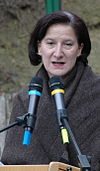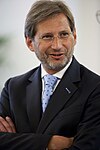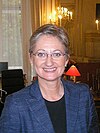Federal government Faymann I
| Federal government Faymann I | |
|---|---|
| 27. Federal Government of the Second Republic of Austria | |

|
|
| Chancellor | Werner Faymann |
| choice | 2008 |
| Legislative period | XXIV. |
| Appointed by | Federal President Heinz Fischer |
| education | December 2, 2008 |
| The End | December 16, 2013 |
| Duration | 5 years and 14 days |
| predecessor | Federal Government Gusenbauer |
| successor | Federal government Faymann II |
| composition | |
| Party (s) | SPÖ and ÖVP |
| representation | |
| National Council | 108/183 |
The federal government Faymann I , a grand coalition of the Social Democratic Party of Austria (SPÖ) and the Austrian People's Party (ÖVP), was formed after the early elections to the National Council on September 28, 2008 . It was appointed and sworn in on December 2, 2008 by Federal President Heinz Fischer . Chancellor was Werner Faymann (SPÖ) Vice Chancellor Josef Pröll (ÖVP). When the government was reshuffled in April 2011, Josef Pröll resigned; Michael Spindelegger (ÖVP) became Vice Chancellor.
Following the elections to the National Council in 2013 , Federal President Heinz Fischer's government was entrusted on October 1, 2013 with the continuation of business until a new government was appointed. The appointment of the federal government Faymann II took place on December 16, 2013.
Government formation
In the election on September 28, 2008, the SPÖ received 29.26% (minus 6.08 percentage points) and the ÖVP 25.98% (minus 8.35 percentage points) of the votes. The FPÖ received 17.54 percent of the votes (plus 6.51 percentage points) and the Alliance Future Austria (BZÖ), which emerged from the FPÖ in 2005, received 10.7% (plus 6.59 percentage points). As federal chairman of the party with the most votes, Faymann was commissioned by Federal President Fischer to form a government on October 8, 2008.
Neither party had a majority for a single government. A coalition of the SPÖ and ÖVP was the only possible two-party coalition. While Faymann spoke out in favor of this variant from the start and ruled out coalition variants with the FPÖ and BZÖ, representatives of the ÖVP had also advocated an ÖVP-FPÖ-BZÖ coalition or for joining the opposition. The financial crisis since 2007 and the risk of a recession in Austria were reasons why Faymann and the new ÖVP federal party chairman Pröll quickly began coalition talks and came to an agreement on a new grand coalition in a relatively short period of 56 days.
composition
The federal government Faymann I was sworn in on December 2, 2008 in the following composition:
The division of responsibilities was largely taken over by the Gusenbauer Federal Government . Only the Justice Ministry, headed by Maria Berger , switched from the SPÖ to the ÖVP and was subordinate to the judge Claudia Bandion-Ortner . In return, the SPÖ received the Ministry of Health from the ÖVP (former Minister Andrea Kdolsky ). Contrary to the concerns of well-known constitutional lawyers, the ministries of the interior and justice were led by ministers from the same party. The previous Foreign Minister Ursula Plassnik announced that she would leave the government. As a reason, she cited differences on the question of whether future EU treaty amendments should be decided by parliamentary channels or through referendums.
There were regroupings within the ministries: The Ministry of Economic Affairs relocated the labor area to the social department, while the sports area was transferred to the Ministry of Defense. The family and youth agendas were handed over from the Ministry of Health to the Ministry of Economic Affairs. Compared to 2006 there were only four instead of six state secretaries.
Gabriele Heinisch-Hosek was appointed Federal Minister without Portfolio on December 2, 2008 and Federal Minister for Women's Affairs and Public Service on December 18, 2008.
Claudia Bandion-Ortner was appointed Federal Minister of Justice on January 15, 2009, as the Bawag trial first had to be concluded. Previously, Science Minister Johannes Hahn was also Minister of Justice for this transition period. She was replaced by Beatrix Karl on April 21, 2011.
Verena Remler was sworn in on November 26, 2010 as the successor to Christine Marek , who moved to the Vienna municipal council and state parliament as head of the ÖVP .
Beatrix Karl was appointed Federal Minister for Science and Research on January 26, 2010, as her predecessor Johannes Hahn was appointed to the European Commission (Barroso II).
Government reshuffle in April 2011
On April 13, 2011, Josef Pröll announced his impending resignation as Vice Chancellor and Finance Minister as well as ÖVP chairman for health reasons. The ÖVP designated Michael Spindelegger as the new Vice Chancellor and new ministers and state secretaries for some of its ministries. The dismissal of the old and appointment of the new ministers and state secretaries took place on April 21, 2011.
Here switched Maria Fekter by the Interior Ministry to the Ministry of Finance. The previous Lower Austrian Provincial Councilor Johanna Mikl-Leitner became the new Interior Minister . Claudia Bandion-Ortner left the government and was replaced in the Ministry of Justice by the previous Minister of Science, Beatrix Karl . This was followed by the previous rector of the University of Innsbruck Karlheinz Töchterle .
With the government reshuffle, some of the state secretaries were also reassigned to other ministries. Wolfgang Waldner was appointed State Secretary in the Foreign Ministry and Sebastian Kurz in the Interior Ministry . The chairman of the JVP, Sebastian Kurz, previously a councilor in Vienna, was entrusted with the integration agenda. For these two newly appointed state secretariats, the state secretariats previously occupied by Reinhold Lopatka in the Ministry of Finance and Verena Remler in the Ministry of Economic Affairs no longer existed .
Government reshuffle in March 2013
On March 5, 2013, Federal Chancellor Faymann and Minister of Defense Norbert Darabos announced that Darabos would step down as Minister of Defense and Sport on March 11, 2013 and return to the SPÖ's party headquarters as Federal Managing Director. His successor was the Styrian parliamentary group leader of the SPÖ in the Federal Council, Gerald Klug .
Overview
| Office | photo | Surname | Political party | State Secretary | Political party | ||
|---|---|---|---|---|---|---|---|
| Chancellor | Werner Faymann | SPÖ | Josef Ostermayer | SPÖ | |||
| Vice Chancellor |
Josef Pröll until April 21, 2011 |
ÖVP | |||||
|
Michael Spindelegger from April 21, 2011 |
ÖVP | ||||||
| European and International Affairs | Michael Spindelegger | ÖVP |
Wolfgang Waldner from April 21, 2011 to August 22, 2012 |
ÖVP | |||
|
Reinhold Lopatka from September 11, 2012 |
|||||||
| Interior |
Maria Fekter until April 21, 2011 |
ÖVP | |||||
|
Johanna Mikl-Leitner from April 21, 2011 |
ÖVP |
Sebastian Kurz from April 21, 2011 |
ÖVP | ||||
| Judiciary |
Johannes Hahn until January 15, 2009 |
ÖVP | |||||
|
Claudia Bandion-Ortner until April 21, 2011 |
Non-party (nominated by the ÖVP) | ||||||
|
Beatrix Karl from April 21, 2011 |
ÖVP | ||||||
| Finances |
Josef Pröll until April 21, 2011 |
ÖVP |
Reinhold Lopatka until April 21, 2011 |
ÖVP | |||
|
Maria Fekter from April 21, 2011 |
Andreas Schieder | SPÖ | |||||
| Economy, family and youth | Reinhold Mitterlehner | ÖVP |
Christine Marek until November 26, 2010 |
ÖVP | |||
|
Verena Remler until April 21, 2011 |
|||||||
| Labor, social and consumer protection | Rudolf Hundstorfer | SPÖ | |||||
| Agriculture, forestry, environment and water management | Nikolaus Berlakovich | ÖVP | |||||
| National defense |
Norbert Darabos until March 11, 2013 |
SPÖ | |||||
|
Gerald Klug from March 11, 2013 |
SPÖ | ||||||
| Transport, innovation and technology | Doris Bures | SPÖ | |||||
| Lessons, arts and culture | Claudia Schmied | SPÖ | |||||
| Science and Research |
Johannes Hahn until January 26, 2010 |
ÖVP | |||||
|
Beatrix Karl until April 21, 2011 |
ÖVP | ||||||
|
Karlheinz Töchterle from April 21, 2011 |
ÖVP | ||||||
| health | Alois Stöger | SPÖ | |||||
| Chancellery Minister for Women's Affairs and Public Service | Gabriele Heinisch-Hosek | SPÖ | |||||
Literature and Sources
- Government program of the Faymann government ( pdf , 987 KiB, spoe.at)
- Government declaration, declaration by the federal government (1 / RGER) by Werner Faymann. In: 6th session of the National Council of the Republic of Austria. Shorthand protocol, Wednesday, December 3, 2008, pp. 31–44 (afterwards: debate)
- Further parliamentary materials: Parliament active> All items on the agenda : since October 28, 2008 XXIV legislative period
Web links
Individual evidence
- ^ Constitutional experts : Police and justice at the ÖVP are "nonsense" . In: The Standard of November 21, 2008, accessed November 24, 2008
- ↑ In detail: The allocation of departments. In: The Standard . November 23, 2008, accessed January 10, 2014 .
- ↑ Claudia Dannhauser and Erich Witzmann: Plassnik could not follow the EU line. In: The press . November 23, 2008, accessed January 10, 2014 .
- ^ ÖVP and SPÖ agree on a grand coalition. (No longer available online.) In: Rheinische Post . November 23, 2008, archived from the original on December 6, 2008 ; accessed on January 10, 2014 .
- ^ Austria: SPÖ and ÖVP form a grand coalition. In: The time . November 23, 2008, accessed January 10, 2014 .
- ^ SPÖ government team. In: The Standard. November 24, 2008, accessed January 10, 2014 .
- ^ ÖVP government team. In: The Standard. November 24, 2008, accessed January 10, 2014 .
- ↑ ÖVP and SPÖ introduce government team. In: The press. November 24, 2008, accessed January 10, 2014 .
- ↑ Federal Minister Gabriele Heinisch-Hosek ( memento of December 29, 2008 in the Internet Archive ) on December 18, 2008
- ↑ Belatedly sworn in ( memento of December 16, 2013 in the Internet Archive ) on January 15, 2009
- ^ BM for Science and Research on January 26, 2010
- ↑ ORF: Beatrix Karl sworn in ( page no longer available , search in web archives ) Info: The link was automatically marked as defective. Please check the link according to the instructions and then remove this notice. on January 26, 2010
- ^ The press : Team Spindelegger sworn , April 21, 2011.
- ↑ Replacement of Darabos



















